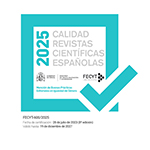Estudio de la traducción alemán-español de neologismos relacionados con el turismo sostenible
Résumé
El turismo sostenible contribuye a alcanzar, directa o indirectamente, los Objetivos de Desarrollo Sostenible de la Agenda 2030, como el crecimiento económico inclusivo y sostenible, el uso sostenible de los océanos y los recursos marinos, o el consumo y la producción sostenibles, entre otros. En nuestro país, el turismo es uno de los principales motores de ingresos y, en aras de mantener esta ubicación o escalar posiciones en el sector, se debe ofrecer un turismo de calidad y permanente, con productos de calidad y, por consiguiente, con una información multilingüe de calidad. El presente estudio se centra en la importancia de analizar y traducir los neologismos con el fin de comercializar las actividades turísticas de desarrollo sostenible. Para ello se extraen ejemplos procedentes de textos institucionales que integran esta temática redactados en lengua alemana y española y se analizan contrastivamente para determinar las dificultades de traducción emergentes durante el trasvase a nuestra lengua meta. Finalmente se expondrán una serie de conclusiones sobre la creación léxica y la traducción de este turismo en España, país comprometido con el medio ambiente y la cultura autóctona.
Téléchargements
##submission.format##
Licence
La revista Estudios de Traducción, para fomentar el intercambio global del conocimiento, facilita el acceso sin restricciones a sus contenidos desde el momento de su publicación en la presente edición electrónica, y por eso es una revista de acceso abierto. Los originales publicados en esta revista son propiedad de la Universidad Complutense de Madrid y es obligatorio citar su procedencia en cualquier reproducción total o parcial. Todos los contenidos se distribuyen bajo una licencia de uso y distribución Creative Commons Reconocimiento 4.0 (CC BY 4.0). Esta circunstancia ha de hacerse constar expresamente de esta forma cuando sea necesario. Puede consultar la versión informativa y el texto legal de la licencia.









